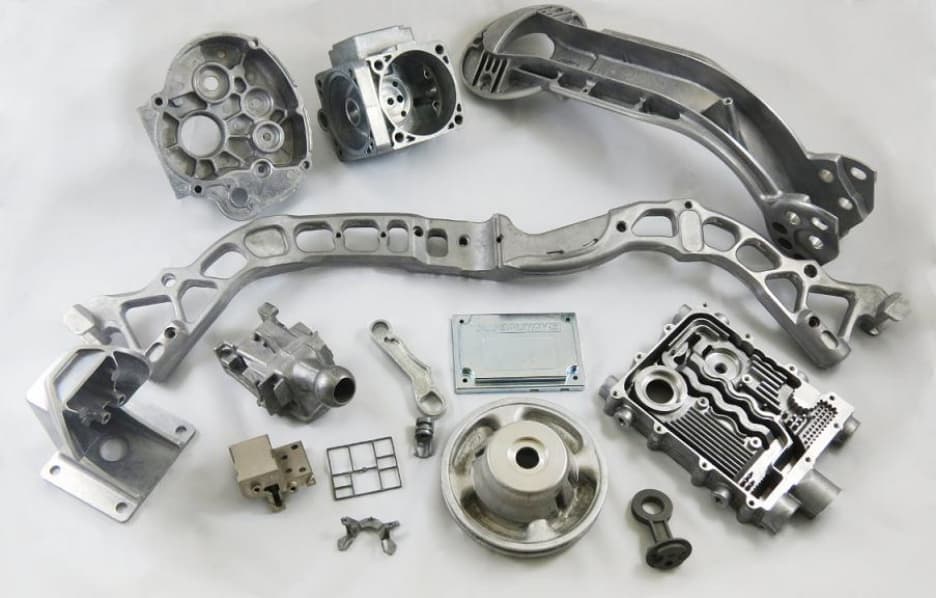The Essential Uses of Aluminum Foundry in Various Industries and Their Effect
Aluminum shops function as an important source within countless industries. Their sturdy and light-weight materials considerably boost performance in vehicle, aerospace, building and construction, and electronic devices sectors. As each industry leverages aluminum's distinct properties, they likewise add to sustainability initiatives. This multifaceted impact triggers a deeper exploration of how Aluminum shaped these fields. What details innovations and benefits arise from its use?
Automotive Industry Applications
The automotive industry increasingly relies upon Aluminum Foundry applications to enhance vehicle efficiency and performance. Light weight aluminum's light-weight nature adds substantially to sustain economic situation, making it a preferred option for producers aiming to reduce emissions and improve general car characteristics. Elements such as engine blocks, transmission real estates, and wheels are frequently generated via Aluminum casting procedures, allowing for complex layouts that satisfy strenuous safety and performance standards.

Aerospace Innovations

In addition, using aerospace-grade Aluminum alloys enhances resistance to corrosion and tiredness, necessary for the requiring settings aircraft face. Innovations in additive manufacturing additionally permit for quick prototyping and modification of elements, decreasing lead times and prices.
Building and Facilities
While the construction and framework fields continue to evolve, Aluminum foundries are significantly recognized for their payments to modern structure methods. Aluminum's lightweight nature and high toughness make it an ideal product for numerous architectural applications. Foundries provide elements such as light beams, structures, and facades that boost the toughness and durability of structures and framework jobs.
Additionally, aluminum's rust resistance plays a vital duty in prolonging the life-span of frameworks subjected to harsh ecological problems. The energy effectiveness of Aluminum items likewise aligns with lasting building initiatives, contributing to lower power usage in building and construction. Furthermore, ingenious casting strategies have broadened the layout possibilities, enabling designers and engineers to create visually pleasing yet functional structures.
Electronics Production
Aluminum shops play a significant function in the electronic devices making sector, where the need for lightweight and thermally conductive materials is extremely important. Aluminum Foundry. Components such as warmth sinks, coverings, and brackets are commonly produced using Aluminum because of its outstanding thermal properties and capacity to dissipate warm efficiently. This is more crucial in digital gadgets, where overheating can result in failure and reduced performance
The flexibility of Aluminum permits complex layouts and specific machining, which are necessary in modern-day electronics. On top of that, light weight aluminum's non-magnetic residential or commercial properties make it suitable for applications in sensitive digital tools, decreasing disturbance. Aluminum's resistance to deterioration improves the sturdiness of electronic components, ensuring longevity and integrity.
Sustainability and Recycling Initiatives
Offered the boosting emphasis on ecological duty, the Aluminum Foundry sector has made substantial strides in sustainability and recycling initiatives. Aluminum is inherently recyclable, enabling foundries to recycle and recover material with minimal power expenditure contrasted to main production. This closed-loop recycling process not just minimizes waste yet additionally reduces greenhouse gas emissions, contributing to a more lasting manufacturing version.
Additionally, many shops are adopting energy-efficient technologies, including renewable power sources, to power their procedures (Wisconsin Aluminum Foundry). This change not just decreases reliance on nonrenewable fuel sources however also enhances general functional efficiency
Market collaborations are more advertising lasting practices, such as sharing best practices and developing ingenious reusing techniques. By focusing on these initiatives, the Aluminum Foundry sector is positioning itself as a leader in sustainable manufacturing, aligning with worldwide targets for sustainability while meeting the demands of numerous industries.

Regularly Asked Concerns
What Are the Key Benefits of Utilizing Aluminum in Foundry Processes?
The key advantages of making use of Aluminum in Foundry processes include its light-weight nature, superb deterioration resistance, high thermal and electric conductivity, and adaptability, permitting elaborate styles and reliable recycling, ultimately boosting general production efficiency and decreasing expenses. - Aluminum Foundry
Exactly How Does Aluminum Foundry Impact Item Lifecycle Monitoring?
Aluminum Foundry considerably improves product lifecycle administration by allowing efficient product use, minimizing waste, and helping with recycling. Its lightweight homes improve transportation effectiveness, while toughness prolongs product life-span, eventually adding to sustainability and cost-effectiveness in manufacturing.
Are There Certain Challenges in Aluminum Foundry Manufacturing?
Specific difficulties in Aluminum Foundry manufacturing consist of managing temperature control, making sure worldly top quality, decreasing waste, and adapting to fluctuating market needs. These elements can influence effectiveness, price, and general competition within the industry.
What Precaution Are Essential in Aluminum Foundry Workflow?
Essential security procedures in Aluminum Foundry procedures include individual safety tools, proper ventilation, normal equipment maintenance, risk interaction, and emergency action training. Executing these methods guarantees continue reading this employee safety and lessens dangers connected with high-temperature steel handling.
How Does the Expense of Aluminum Compare to Various Other Metals in Foundry Usage?
The expense of Aluminum is usually less than that of steels like copper and titanium, making it an affordable choice for many Foundry applications. This affordability adds to its extensive use throughout different markets.
Aluminum foundries serve as an important resource within various industries. The automotive industry significantly counts on Aluminum Foundry applications to boost automobile performance and effectiveness. The material's recyclability additionally straightens with the industry's press towards sustainability, as recycled Aluminum needs considerably much less power to process compared visit the site to main light weight aluminum. Aluminum foundries play a significant function in the electronics manufacturing industry, where the demand for light-weight and thermally conductive products is vital. Provided the boosting emphasis on environmental duty, the Aluminum Foundry sector has actually made considerable strides in sustainability and recycling initiatives.